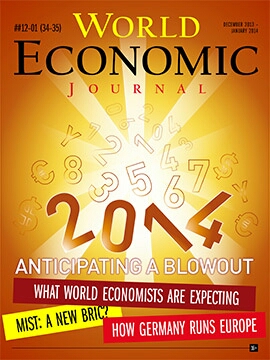December – January

The Main Topics of the December-January Issue of the World Economic Journal:
Dialogues: The Main Point
“Eurasian economic integration is a project that has some prospect of success”
Professor Julian Cooper, an expert of the Royal Institute of International Affairs, in an interview with WEJ spoke about the prospects of the Customs Union of Russia, Belarus, and Kazakhstan, the potential for its expansion, and the risks to the Eurasian Customs Union’s stable development.
Cover Story
What the New Year Has in Store for Us
WEJ interviewed leading experts in the fields of international relations and the world economy in order to find out which trends, prospects, and challenges can be expected to surface in 2014.
Investments and Macroeconomics
Society
21st-Century Slaves
To those living in developed countries, slavery seems a thing of the past, even if it was still around in the century before last. But the fact is that about 30 million people worldwide live in modern slavery, with nearly half of them (14 million) in India.
Trends
Big Mac Economy
What’s the first thing that comes to mind when one sees the words Big Mac Index? An index of annual burger consumption? An index of the prevalence of fast-food establishments in different countries? Who could have thought that the Big Mac Index is directly related to the economy and only indirectly related to burgers?
Possibilities
The Mexican Miracle
Mexico is already the world’s largest exporter of plasma televisions and Blackberry smartphones, and cars stamped “Made in Mexico” are taking to the roads far beyond North America.
Analysis
Reshuffling Nigeria’s Position
Analysts at World Economic Journal have taken the advice of Goldman Sachs’s Jim O’Neill in replacing Korea with Nigeria in the new grouping of developing economies. They have also evaluated the most important macroeconomic performance indicators of these countries.
Dangers
The Russian Economy in Crisis
Most people perceive that Russia’s financial position is quite stable. The country’s currency reserves are around $500 billion, which is almost three times the public debt. But considering the slowing rates of economic growth, the high dependency on oil and gas, and the accelerating outflow of capital from the country, the 2014 macroeconomic forecast does not have any notable successes in store for Russia.
Eastward
The New Silk Road: Grand Ambitions of the Middle Kingdom
In the fall of 2013, the People’s Republic of China announced a massive economic project called “The New Silk Road.” Beijing has given formal recognition to a trend dating back to the 1990s to include Central Asian countries in the orbit of the Chinese economy. Now, this trend has gained a clear and concrete form through this ambitious project, which brings together China, the countries of Central Asia, and possibly Central Europe.
Banking and Finance
Eurozone
Germany Accused of Success
Angela Merkel, after a resounding victory in the elections, presented the new German government in December. The country is hitting record exports but has incurred the criticism of the EU in Brussels, which blames Germany for the imbalance in the European economy.
Startups
“We Have Learned to Pay Attention to Innovations in Everyday Life”
The Ideal Products Factory is the joint brainchild of businessman Mikhail Dashkiev and scientist Aleksey Noniashvili and offers rather simple and original technological development for various things ranging from the ideal iPhone case to the ideal air conditioner and transportation systems for lime production, setting them apart from other global Russian projects. WEJ invited the partners to define what innovation means in emerging markets.
Global Real Estate
Housing
Rental, German-Style
Most Germans live in rented apartments, and these days Germany is becoming one of the most popular destinations for foreign real estate investors. So why are Germans so keen on buying and not renting?

